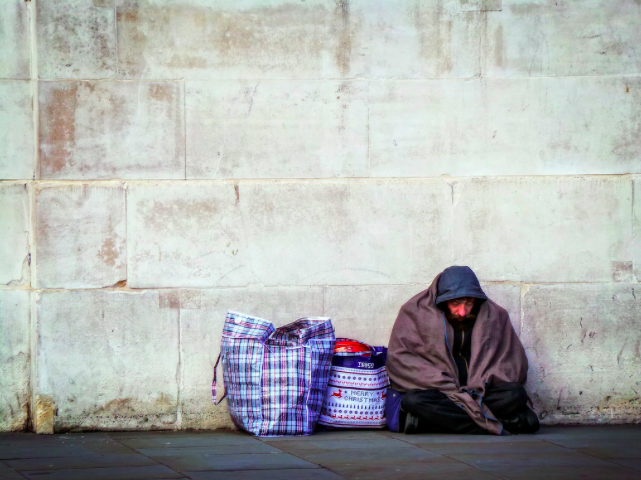As the weather gets colder and the winter months approach, the homelessness crisis has become more urgent than ever before. The harsh but stark truth is, the average age of a man who dies whilst homeless is just 47 and for women it is even lower, at just 43. In 2018, there are more than enough resources to ensure everyone has a good quality of life – however, almost 5,000 people across the UK are forced into sleeping rough, going hungry and not being assured the most basic human rights.
This crisis has increased by more than 169 per cent since 2010, but despite wider public engagement, increased media coverage and new government legislation, this issue of homelessness is only increasing. Understandably, homelessness is most prevalent in bigger cities and places that have a higher population, and is most rife in the centre of London, and in Manchester. However, homelessness is now also being seen in smaller cities, towns and even villages across the UK, and is also apparent in affluent parts of the UK, where residents would have been strangers to seeing people sleeping rough on their local high street.
A recent increase in the government’s awareness and recognition of this vast problem has resulted in new action to try and get people off the streets. This solution has come in the form of the Homelessness Reduction Act, which is introducing a new ‘Rough Sleeping Team’ who have been tasked with driving reductions in the number of rough sleepers. They have introduced a targeted £30 million fund for 2018-2019 for local authorities, however, it only targets areas with the highest levels of rough sleeping. The government’s overall aim is to halve rough sleeping by 2022 and eliminate it by 2027, however, many have questioned whether this goal is ambitious enough.
The sudden drop in temperature that the UK has recently experienced creates a great number of challenges for someone who is homeless and sleeping rough. Last winter, it was estimated that at least 78 homeless people lost their lives because of injuries caused by the cold. Aside from finding ways to survive the cold weather, there are numerous other challenges and problems that homeless people have to face on a daily basis.
On a basic level, homeless people do not have access to bathrooms or places to clean themselves, which leads to unhygienic conditions and possible illnesses and diseases. They do
not have the money or access to drinking water or a healthy or balanced diet, and often don’t even get to eat one decent meal a day. Typically, homeless people do not have a permanent address, which has a number of consequences. For example, not being able to list a permanent address on official documentation when trying to apply for jobs – a statutory requirement in most cases. If you are homeless, your life is subject to a great amount of uncertainty and basic needs such as where your next meal is coming from and where you are going to sleep that night, can lead to potential mental health issues that can have a lasting effect.
The government is hoping to combat these problems and eliminate homelessness, however, the goals they have set out, to irradiate homelessness by 2027, does not go far enough. If using last year’s data is anything to go by, this would mean that a further 702 people would pass away because they are forced to sleep rough on the streets of the UK.
To help the government and enable them to reach their goals, and possibly even supersede them, charities and the public are going to need to pitch in and help the government along the way. There are plenty of things that people can do to help those who are homeless and living on the streets.
- Donate – there are plenty of charities that are doing great work and make a really important difference to the lives of those who are homeless. Donations can contribute towards providing someone with a bed for the night, a meal to fill them up or to start them on a path to housing them or finding them a job.
- Attend events – lots of charities and organisations also put on events, to raise money but also to inform the general public a little more. These events provide an opportunity to learn more about homelessness and understand the challenges people go through. These events are also great to remove the stigmas that are attached to homelessness and ensure people know what they can do to help homeless people when they see one who is in need.
- Volunteer & Campaign – charities are always looking for more volunteers to go out and continue the good work that have already started. The more people who are out there making a difference, the better.
- Get in touch with Crisis, Shelter and The Big Issue Foundation, who are all doing excellent work to help those in need.




